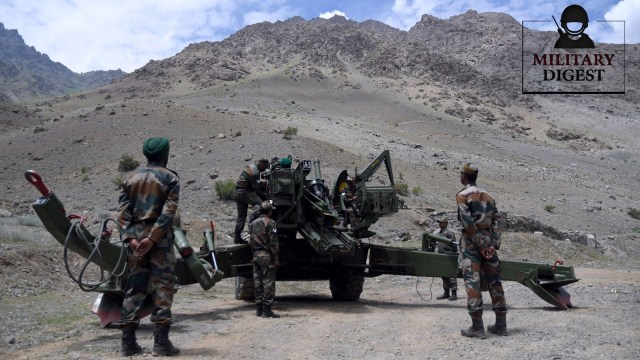Military Digest: Ex-major says there were sufficient warnings about Kargil intrusions, demands answers
Manish Bhatnagar, who was court-martialled after the Kargil war, says no officer above the brigadier rank has been faulted for the alleged failures.
 Former officer of the 5th Battalion of The Parachute Regiment (5 Para), ex-major Manish Bhatnagar, has raised several questions regarding the discovery of the Kargil intrusions and the manner in which these were handled subsequently in the conduct of operations. (Express Archive)
Former officer of the 5th Battalion of The Parachute Regiment (5 Para), ex-major Manish Bhatnagar, has raised several questions regarding the discovery of the Kargil intrusions and the manner in which these were handled subsequently in the conduct of operations. (Express Archive)The 25th anniversary of the Kargil war has not only served as a reminder of the valour, tenacity and steadfastness of the Indian troops on the icy heights of Dras, Batalik, Mushkoh and other areas of the battlefield but also brought the alleged intelligence and surveillance failures that led to the conflict back into focus.
It is in this context that a former officer of the 5th Battalion of The Parachute Regiment (5 Para), ex-major Manish Bhatnagar, has raised several questions regarding the discovery of the intrusions and the manner in which these were handled subsequently in the conduct of operations.
Bhatnagar was court-martialled in 2001 and dismissed from service. He had been found guilty of “acts prejudicial to good order and military discipline” and handed out what seemed to be an excessive punishment disproportionate to the offence.
The more serious charge against him pertained to disobeying a command to carry out an attack on a position reportedly occupied by the Pakistan army. However, this charge could not be proven in the course of his court martial and Manish Bhatnagar was found not guilty.
Bhatnagar contended during the course of his trial that he had reported Pakistani intrusions well before they were discovered in May 1999 but that his warnings had been disregarded by the Army top brass.
Bhatnagar says warnings disregarded
Bhatnagar has taken umbrage at a recent television interview in which former Army chief Gen V P Malik (retd) said lack of intelligence inputs and surveillance gaps led to the Kargil intrusions. He served a legal notice on the former Army chief on July 8 seeking withdrawal of the comments, contending that disregarded warnings had in fact led to the intrusions.
Bhatnagar’s contention is that in January-February 1999, he observed and reported enemy activity at Point 5770, the northernmost and highest peak later reclaimed from the Pakistani army regulars as part of Operation Vijay on June 29, 1999, by 27 the battalion of the Rajput Regiment.
Bhatnagar has said that he repeatedly reported enemy activities and exchange of fire while he was in an eyeball-to-eyeball situation close to Point 5770 and that he even spotted an enemy bunker and reported as above, in regular written situation reports, message log books and conversations up the chain of command to his then commanding officer, Col A K Srivastava.
These reports were sent up the chain of command to Brigadier P C Katoch, then commander of the 102 Infantry Brigade and Major General V S Budhwar, then general officer commanding of the 3 Infantry Division.
Bhatnagar says even the post manned by the late Captain Saurabh Kalia reported heavy exchange of fire in the Kargil and Batalik sectors. While being on the forward post, Captain Kalia (as early as three months before official declaration of intrusions), reported mortar, artillery, anti aircraft guns, medium and small arms fire on February 5, 6, 16, 17, 18, 19, 20, 21, 23, 25, March 1, 2(Holi), 6, 12, 13, 14, 15, 16, 17, 18, 23 and 27 in 1999.
“Despite reportings as above, and possibly besides numerous others not within the personal and documentary knowledge of my client, which might have been similarly suppressed at some level up the chain, posts were ordered to be vacated and enemy information not even shared with the neighbouring brigade and higher headquarters up to the Army headquarter level,” the legal notice sent by Bhatnagar’s advocate states.
The former officer has also contended that weeks into the eviction operation, general officer commanding of the 3 Infantry Division, Maj Gen V S Budhwar, continued to send exhausted and fatigued troops for eviction operations, from one sector to another, including those being de-inducted from the Siachen glacier.
Bhatnagar contends that the general officer commanding was ordering deinduction of troops from the Siachen heights of 21,000 ft, making them march for days only to be directly reinducted into eviction operations.
The ex-major says the Kargil war has not been evaluated in its correct, full and overwhelming perspective. “The careers of officers who fought in this war on the front line at various levels, failed to rise except a few, to ranks above Brigadier. Many of them were deprived due and appropriate recognition in the form of war/gallantry medals & decorations such as then Captain Cheema of 27 Rajput, Brigadier Devinder Singh, then Commander 70 Infantry Brigade,” he said.
Bhatnagar added that while junior officers like him suffered dismissal from service, after one of the most controversial trials, no blame or fault has been found with any officer above the brigadier rank for intrusion having taken place, unprecedented eviction and subsequent fudging and manipulation of war records and documents, leading to wrong lessons being drawn.
Questions raised by ex-major Bhatnagar
Was it not possible to accomplish eviction operations with fewer Indian casualties?
Except for the bravery and sacrifices of the young officers and men, has Kargil war not been reduced into a delusional narrative?
Were enemy intrusions collectively termed Kargil intrusions 1999 really a surprise or intelligence or surveillance failure at all?
Hasn’t the standard of generalship seen a massive dip in standards, when compared with the 1971 Indo-Pak war? Wasn’t the operational-level generalship totally lacking?
Was it not a better ground strategy to starve the enemy in terms of supplies and ammunition by cutting off his stretched supply lines running through bowls and valleys, instead of direct assaults of entrenched enemy at massive heights, by own troops in near-suicidal missions, as was finally accomplished by then Commander 70 Infantry Brigade Brigadier Devinder Singh in the fastest manner and with minimal casualties?












